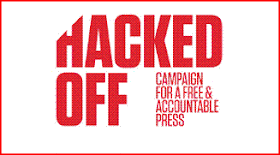 |
| Mair and Johnson (Pic: BBC) |
Eddie Mair to Boris Johnson on the Andrew Marr Show: "You're a nasty piece of work, aren't you?"
Darius Guppy in the Spectator defends Boris: "Mr Mair attacks the Mayor of London for agreeing, when in his mid twenties, to supply a friend – me – with the address of a News of the World journalist so that the journalist in question can be given the hiding which most of us secretly admit such people deserve...As we all know, Mr Johnson never provided me with any address and it is perfectly clear from the tape recording in question that he was simply placating a friend he considered to be letting off steam. But while this may rightly exonerate the Mayor of London, my own line has always been somewhat different – and consistent: my only regret being that I was never able to finish the job."
Tony Parsons in the Daily Mirror: "How did we get to this? A noble and decent impulse to protect the rights of families like the Dowlers and the McCanns has been cynically hijacked by jumped-up political pygmies and sleazy celebrities. You would never guess it from all the Hacked Off propaganda, but newspapers like the one you are holding were emphatically on the side of the parents of Milly Dowler and Madeleine McCann. We desperately wanted them to find their daughters, we sincerely wanted their families restored. We wanted it as journalists, as parents and as human beings. If we felt any other way then you – the reader – would put us out of business overnight."
Guardian editor-in-chief Alan Rusbridger in the Guardian: "We badly need reform. We also need a free press. Achieving both can't be done at speed or in the dark."
Lord Guy Black in the House of Lords on exemplary damages: "I’m sure they are almost certainly contrary to European law and so will collapse or be struck down. I think they are a constitutional nightmare."
Peter Hitchens on MailOnline on David Cameron:"Mr Slippery set up the original Leveson Inquiry in a short-sighted attempt to look good. By the time he realised he had created a great clanking, devouring monster, it was too late to stop. So he pretended that he would prevent the Leveson report from turning into state regulation of the press. Then he realised that he couldn’t, so he disguised his defeat as a decisive act of strength. That was when he abruptly halted the talks in which he was being wrestled to the ground by the press-hating lobby of spiteful, short-sighted leftists and vengeful celebrities. Finally, he was responsible for what will come to be seen as one of the stupidest and most shameful moments in British political history."
Matthew Engel looking back at his days on the Northampton Chronicle and Echo, as reported by HoldTheFrontPage: "Regret no. 1 is that I failed to appreciate what fun it all was and that I would never ever have quite so much enjoyment from journalism again. To have a job that allowed me, at 21, 22, 23, to be at the very heart of a community, to gain an understanding of it I could get in no other way and to write with a surprising amount of freedom about it."
Geoffrey Cox QC, for Sun deputy editor Geoff Webster who is alleged to have authorised reporters to pay £8,000 in total to unnamed public officials in 2010 and 2011, told Westminster Magistrates’ Court: “Mr Webster was engaged in nothing more than doing his job. There is nothing to explain the reason why he has been charged.The only wrong he is said to have done is to approve a number of payments, in one case to an unknown public official.”
Bob Garfield on Comment Is Free: "Text, audio and video are rapidly converging. As journalism brands grow to look more like one another, we are seeing unmistakable signs of publishers slouching toward an ethical lowest common denominator. Anyone who cares deeply about quality, independent journalism should pray for paywalls and other subscription models to take hold. Because in the world of the smart and the desperate, desperate always has the last word."
Michael White on his Guardian politics blog: "Fleet Street is right to protest that there is still much wrong with the cross-party proposals over Leveson, but wrong to say 300 years of press freedom are at stake. It just isn't true. A system of self-regulation with a flick of external monitoring – not as tough as what the tabloids seek for the NHS this week – will just provide a new battleground with no permanent winner. The real threat to newspapers in 2013 is commercial viability in the internet age, not government censorship at a time when censorship looks ever more difficult in free societies."
Professor Ian Hargreaves in the NCTJ's Journalists At Work report, looking back over the last decade: "The pay of journalists has fallen behind general inflation and behind the overall level of pay inflation in the UK, with today’s average journalist salary standing at £27,500 per annum, a fall of 12% in real terms. This weakness in journalists’ pay reflects primarily conditions in newspaper journalism."











